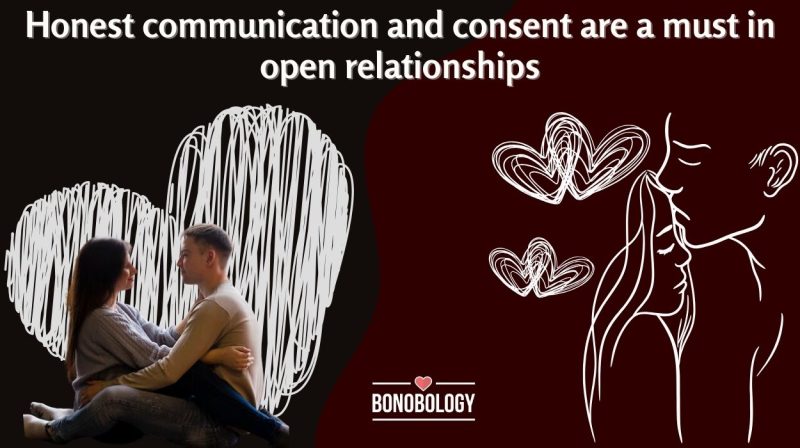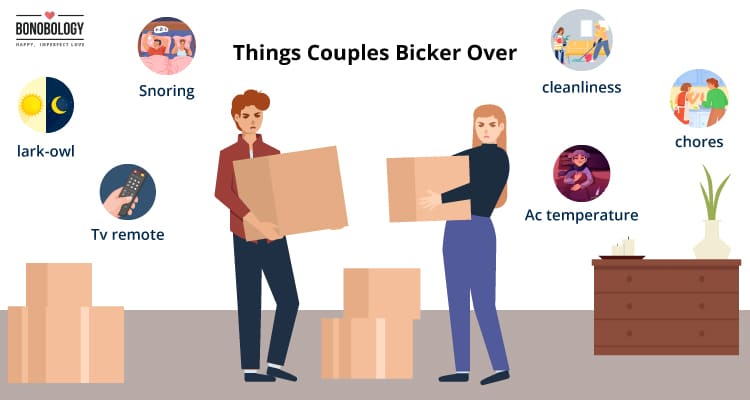Have you been in a committed, stable relationship and thinking about taking the next step with your partner? You ought to have been flirting with the idea of living together, aka cohabitation, even if you haven’t discussed moving in with your partner yet. As more and more adults in the US are delaying or forgoing marriage, according to a Pew Research survey, cohabitation is fast becoming the gold standard of a stable, long-term relationship.
Even if you do want to tie the knot at some point down the line, living together first is considered an organic part of growth and progression in a relationship. However, just because cohabitation works for a majority of couples, doesn’t necessarily mean that it will for you too. Conversely, it can turn out to be the best relationship decision for you and your partner.
Either way, it helps to understand what cohabitation entails, its potential benefits and drawbacks as well as repercussions on your relationship before taking the leap. Let’s delve deeper into the inner workings of cohabitation to help you make an informed decision about whether living together before marriage is a bad idea or a good one.
What Is The Definition Of Cohabitation?
Table of Contents
Cohabitation predominantly implies two people living under the same roof without being legally married. While cohabitating couples may not have a legal stamp of approval, they could have joint property rights, a joint bank account or legal responsibility of children they may have had while cohabiting.
Usually, cohabitation is looked at as an alternative to marriage where you live together as life partners but without the paraphernalia of a wedding or the legalities of marriage. For many modern couples, this freedom from societal and state sanctions on their relationship is one of the biggest benefits of cohabitation over marriage.
For others, cohabitation is looked at as a monogamous relationship that could be a prelude to marriage. This is called premarital cohabitation. But not all couples cohabiting these days are looking at marriage as a culmination of their relationship.
In the present times, the dynamics of cohabitation are becoming more and more fluid and dynamic. For instance, two roommates in a friends-with-benefits relationship living together to share the rent could also be classified as cohabiting. A cohabiting couple could also be in an open relationship. While they experiment with other partners, cohabiting works for them because they can have a stable, primary relationship as well.
The long-term advantages of cohabitation were seen most prominently in the case of LGBTQ relationships since until recently, most states in the US hadn’t legalized same-sex marriages and many countries around the world still do not.
What is an example of cohabitation?
Let’s start with the example of a very famous couple in Hollywood. Actors Goldie Hawn and Kurt Russell started the cohabitation lifestyle way back in 1983. Since then there have been endless speculations about a possible marriage but the couple chose never to get legally married.
For 37 years, they have been cohabiting and are parents to Hollywood star Kate Hudson. Kate is the daughter of Goldie’s former husband Bill Hudson. But to Kate, Goldie and Kurt are the parents she always looks up to. The actors are also parents to Oliver Hudson and Wyatt Russell.
So, if you’re worried that living together before marriage is a bad idea for the future of your relationship, know that you can build a lasting bond even without the stamp of marriage. Given that nearly 50% of marriages in the US end in divorce or separation, ’till death do us part’ isn’t guaranteed.
As Goldie Hawn reiterates in numerous interviews, “You need communication and compatibility to be together. Whether you cohabit or get married it won’t work unless you are ready to give your best to the relationship.”
We must say that not all couples cohabit for so long. Most choose to tie the knot when they look at the long-term aspects of the relationship. But not all couples living together are in it for marriage either.
Does society accept cohabitation? The Pew Research survey conducted in 2019 also shows that 69% of Americans feel it is okay to cohabit even if they don’t plan to get married. Sixteen percent said cohabitation was acceptable only if couples wanted to make it a prelude to marriage and only 14% said that cohabitation was never acceptable.
In fact, the cohabitation vs marriage statistics also indicates that 53% of Americans are married now which is down from 58% in 1995. Currently, 66% of married adults in the US had cohabited before they got married.
Related Reading: Marriage VS Live-In Relationship: Everything You Wanted to Know
Cohabitation Vs Marriage
When the negatives of cohabitation are discussed, it is often argued that living together comes with all the stresses and duties of marriage, minus the legal rights.
Cohabitation might not be legal like marriage but if you are living together as a couple then the law cannot interfere in your life and decisions. But neither does it have the legal stamp of a marriage that automatically gives the partners certain rights.

When two people are married, property ownership, custody of the children, the responsibility of debts and inheritance rights are protected by legal statutes. But that does not happen in the case of cohabiting couples. It is owing to these legal consequences of cohabitation that a majority of couples decide to formalize their relationship by getting married even if the live-in arrangement has been working perfectly well for them.
Even so, more and more people in the US are opting for cohabitation. Cohabitation statistics show that between 1970 and 1990 the number of couples cohabiting in the US went up from 523,000 to 3 million. The numbers actually quadrupled in 20 years. Now, that number stands at 17 million.
The reasons for cohabitation are many. For starters, couples want to find out their compatibility before they want to commit to a marriage. Also, cohabitation has financial reasons. The wedding is a costly affair, many people are still paying a student loan when they start cohabiting and living together is a great way of sharing rents and daily costs.
Another major factor that is often ignored in the cohabitation vs marriage debate is the marriage penalty tax that is levied in the US. Couples who earn high incomes have to pay more taxes when they get married but couples with low incomes or single-earning households are given the marriage bonus. Also, when a married couple buys a home they have to pay a much higher mortgage interest rate.
So the financial calculations work better in terms of cohabiting than marriage. This is undoubtedly among the long-term advantages of cohabitation. Although a married couple enjoys more legal rights.
What Are The Advantages Of Cohabitation?

Today, as more and more young people are opting for cohabitation, they’re also mindful of the potential challenges and roadblocks they may face along the way and take proactive measures to iron out the issues that have plagued earlier generations.
Rather than just move in with a partner lock, stock and barrel on a whim, they opt for a cohabitation agreement that would allow them not to fret over joint property investments or child custody in case they plan to go their separate ways.
The Pew survey statistics once again show that 65% of Americans want cohabiting couples to have legal rights like married couples. But till that happens, the cohabitation agreement allows some advantages to a cohabiting couple.
When done methodically, some of the long-term advantages of cohabitation include:
1. Property rights
It allows 50:50 ownership to a couple when they invest together in a property. The rights are very clear and there is no fuzzy area. So, if a couple decides to part ways there are no legal hassles over property rights because it’s all written in the cohabitation agreement.
2. Financial agreement
If the arrangement on sharing expenses is clearly chalked out, defining how much both partners would pitch in the mortgage and EMI, insurance and so on, there isn’t constant strife around finances. This is a great advantage because married couples do not have an agreement like this to fall back on when dealing with financial issues.
3. Custody and maintenance
In case of a split, there isn’t a need to fight a nasty custody battle. Both partners can decide beforehand on the custody and maintenance of the children in case they opt to separate. The co-parenting agreement is already in place so the split is smooth.

4. Reduces stress
Since both partners are living together out of their free will and not because they’re bound together by marriage, the relationship can be less stressful. One of the benefits of cohabitation over marriage is that you can walk out without getting tangled in a long-winding, emotionally and financially draining divorce battle if the relationship isn’t working out.
5. Greater intimacy
Whether you’re living together to test your compatibility as life partners or have chosen the cohabitation lifestyle to share your lives with each other, it can bring greater intimacy in the relationship. Living with someone allows you to understand them in ways that being in a relationship just cannot. At the same time, cohabitation means you can live with each other without all the fuss that comes with marriage. In short, it can be that sweet spot between being in a relationship and being married that brings you closer and strengthens your bond.
Related Reading: Moving In Together Checklist – Know Your Readiness
What Are The Disadvantages Of Cohabitation?
While cohabitation has a whole lot of advantages because you get to know each other better, it also has some disadvantages. Some of the negatives of cohabitation include:
1. Knowing too much
Sometimes knowing each other too much can be a disadvantage. Many couples quickly become sick of each other’s presence and what started as a prelude to marriage could end quickly. Since they are not legally bound like in a marriage, a small issue could lead to a couple parting ways.
2. Insecurity in a relationship
One of the unpleasant effects of cohabitation is that overcoming insecurities in a relationship can become harder. This is especially true if one partner views living together as a stepping stone to marriage and the other considers it as the end goal. This often creates complications in relationships.
3. Expectations soar
Even if a couple starts cohabitating for the short term, an emotional bond is bound to develop. One partner may expect the relationship to become permanent and even expect to get married at some point while the other might not be ready for it. In such scenarios, cracks develop in the relationship and you may have to go through the painful experience of breaking up with a live-in partner.
4. Trust issues
Married couples tend to trust each other more and feel more secure in their relationships than their cohabiting counterparts. The feeling that it could end anytime may loom large, leading to trust issues between partners. In the absence of clear and healthy communication and transparency, cohabitating couples may find themselves working doubly hard to build trust in the relationship.
5. Children’s security
The same insecurities that cohabitating couples grapple with may also affect their children. The fear that their parents could part ways at any time can be an unsettling feeling to grow up with. Besides, if the intricacies of custody and co-parenting in case of a split aren’t hashed out beforehand, the ensuing legal battle can be harrowing for both parents and children.
Why Are More Couples Cohabiting?
As cohabiting statistics have shown, more and more couples are choosing to live together instead of tying the knot. Although some couples may get married eventually, the first question is rarely, “Will you marry me?” More often than not, it is, “Will you move in with me?”

Why are more and more people opting for cohabitation? Here are some effects of cohabitation that driving this trend:
1. No belief in the institution of marriage
This shift from marriage to cohabitation has happened because most millennials who are choosing to live in right now have grown up in a society where they have seen marriages breaking up pretty often. The divorce statistics in the US show that while 6.8 per 1,000 people in the US get married every year, 3.2 per 1,000 get divorced. So almost half of the marriages end in a divorce.
Many young people have witnessed their parents’ divorce and they do not want to deal with it in their own lives. That is one of the major reasons why the present generation is wary of marriage. The freedom from legal hassles of divorce is seen as one of the benefits of cohabitation over marriage by many couples.
Related Reading: Should You Get A Divorce?- Take This Divorce Checklist
2. Financial reasons for cohabitation
Is it wrong to live together before marriage? Not at all. Cohabitation statistics show that more people are okay about living together than ever before. And many choose the cohabiting lifestyle for the practical benefits it offers.
Case in point: couples opting to cohabit because of financial reasons. In a volatile economy – due to recessions, inflations, and now a global pandemic that has dragged on for a year-and-a-half – people are perpetually plagued by job loss, low-income levels and job stress. These factors get in the way of taking a leap into marriage and starting a family.
A rise in rents, real estate prices and a shrinking job market are throwing more people into a quarter-life crisis than ever before. Most millennials never feel financially settled enough for marriage. As mentioned earlier, taxes levied on married couples as opposed to single people don’t make marriage favorable either.
Cohabitation can be a pleasant alternative in such a scenario, as it allows you to share your life with someone you love without adding to the already daunting financial stress in your life.
3. Socially acceptable
Not only are there fewer legal consequences of cohabitation today but it has also become more socially acceptable not only in the US but also in conservative societies like India. People are not judged for their cohabiting lifestyle and it is often seen as a great option by the older generation too.
Cohabiting couples often establish strong bonds with their partner’s families too, making marriage seem less and less necessary. They do not need the social sanction of a marriage to live a fulfilling life. So cohabitation works wonderfully well for them.
4. It’s easy to move in together
All you need is a house or an apartment to move in together. Most people do not even go through the formalities of a cohabitation agreement. They are just happy sharing the same roof.
Gradually, they find their way through their relationship and decide whether they want to graduate to being married or are happy with the way things stand. Either way, moving in together is the first big step most couples take in a relationship once both partners are committed to each other.
5. Cohabitation means you are serious about each other
Not every relationship ends in cohabitation. You could date a number of people but you plan to move in together only with someone you’re emotionally invested in and share an intimate connection with. In many ways, cohabitating is a sign that you see your partner as ‘the one’.
You are serious about them and see a future with them. After all, you can share your bathroom and your bed only with someone you share a certain comfort level and familiarity with.
Apart from sharing rent or experimenting with relationships, if two people in a monogamous relationship move in together, then it means they are serious about their future. Cohabitation means the relationship is all set for the next level.
Now that you have an elaborate insight on what cohabitation is and how to make a work, you can find a more definitive answer to whether or not it’s the right fit for you. Weigh the positives and negatives of cohabitation before you take the plunge. And more importantly, sit down with your partner to chalk out the finer details of your living arrangement before you move in together to avoid any unpleasant surprises down the line.
FAQs
A Pew Research Centre survey conducted in 2019 shows that 53% of Americans are married now which is down from 58 per cent in 1995. Currently, 66% of married adults in the US had cohabited before they got married. So, yes, cohabitation is quite common.
Couples cohabitate because they want to know each other better. Sometimes they come from divorced families and do not believe in marriage. Also, living together works out to be a financially sound decision for many couples, as they don’t have to pay taxes and higher mortgages that married people, who earn well, have to.
Cohabitation is still illegal in states like Mississippi, Michigan, Florida and Virginia in the US.
Only marriage can lead to divorce. You can have a cohabitation agreement specifying details like division of assets and child custody rights. When a cohabiting couple parts ways they just have to honor the agreement.
Your contribution does not constitute a charitable donation. It will allow Bonobology to continue bringing you new and up-to-date information in our pursuit of helping anyone in the world to learn how to do anything.





















